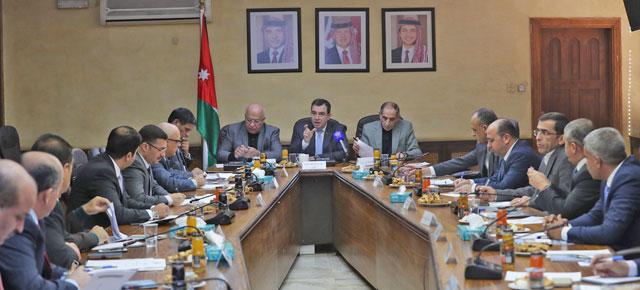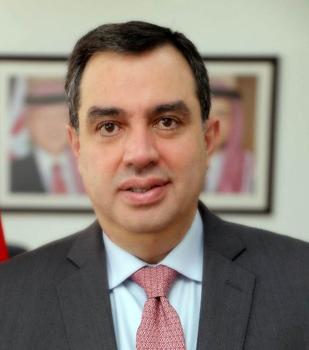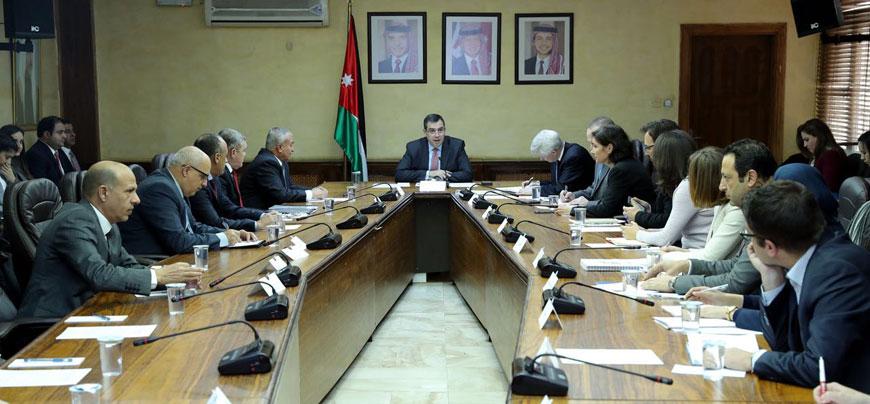You are here
Ministerial Committee reviews decentralisation plan for 2018
By JT - Dec 12,2017 - Last updated at Dec 12,2017

Planning and International Cooperation Minister Imad Fakhoury, Interior Minister Ghaleb Zu’bi, Minister of Political and Parliamentary Affairs Musa Maaytah, secretary generals of the concerned ministries and presidents of the governorate councils attend a ministerial meeting on Tuesday (Photo courtesy of Planning Ministry)
AMMAN — Planning and International Cooperation Ministry on Tuesday hosted a meeting of the Ministerial Committee on Decentralisation chaired by Interior Minister Ghaleb Zu’bi, a Planning Ministry statement said.
Planning and International Cooperation Minister Imad Fakhoury, Minister of Political and Parliamentary Affairs Musa Maaytah, secretary generals of the concerned ministries and presidents of the governorates councils attended the meeting.
The committee listened to the demands of the councils’ presidents to improve the decentralisation system, which is based on His Majesty King Abdullah’s vision to enhance people’s participation in the political reform process, according to Fakhoury.
The minister added that the meeting focused on the requirements of the decentralisation project in 2018 in terms of strategic and executive development plans for each governorate, which will be based on the creation of two guides: one on the municipalities’ needs and another on the governorates’ needs, the statement said.
The participants were provided with the details of the plans, in addition to investment plans for governorates, feasibility studies of the investment opportunities in the governorates, draft of the “needs guide” and details of the Jordan Response Plan for the Syrian Crisis.
For his part, Zu’bi said that the meeting was the beginning of the work on the decentralisation project, stressing that Jordan has become a regional leader in the field.
Decentralisation will directly connect citizens with the government and help them participate in the decision-making process related to their governorates’ development priorities, the statement continued.
Minister Maaytah said that the ministry’s role was to coordinate the needs of the councils and to work with them in accordance with the legislations and the specific roles of each body.
Fakhoury said that the practical framework to support the councils begins with the ministerial committee as the basic pillar of the government’s efforts to help the governorates and the executive councils, as well as to support the outcomes of decentralisation within a comprehensive plan that includes all citizens and bridges the development gaps among governorates.
The ministerial committee’s task is to follow up on the work of the seven domains committees, which are legislation, institutional capacity, awareness, institutional and organisational structures, evidence and procedures, finance, local development and services and ICT, the statement added.
Fakhoury noted that the role of the Planning Ministry is to support and build capacity of the local councils, executive councils and governorate councils, and executive bodies in all administrative, technical, institutional, leadership, strategic planning and development planning fields.
He said that relevant programmes are currently under way, such as CITIES project in cooperation with the USAID, the project to support decentralisation in cooperation with the Organisation for Economic Co-operation and Development, the local government’s Support Project in cooperation with the Dutch Municipal Federation, the project of decentralisation and support to local development financed by the EU.
He also cited the project to support the municipal sector in cooperation with the Federation of Canadian Municipalities, through which 12 municipalities will be trained in strategic planning and decentralisation and the project to support decentralisation, through the Global Partners Foundation, the statement concluded.
Related Articles
AMMAN — The ministries of interior and planning and international cooperation have concluded a series of field visits to all governorates to
AMMAN — The Ministry of Planning and International Cooperation, with the support of the United Nations Development Programme (UNDP), on Mond
AMMAN – Interior Minister Salameh Hammad on Tuesday chaired a meeting to discuss the executive framework of the Decentralisation Law, the Jo


















